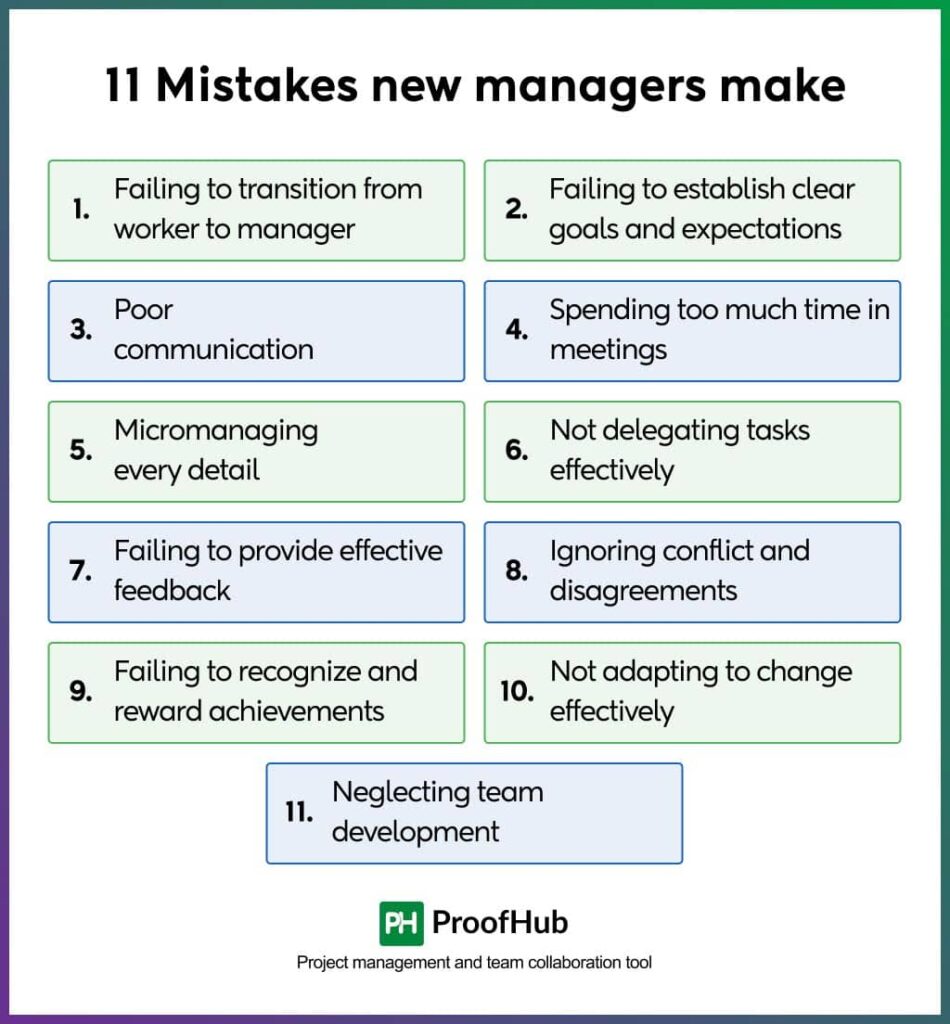Introduction
Becoming a manager is an exciting milestone, but it comes with its challenges. Many new managers feel confident stepping into the role, thinking they have everything under control. However, the reality is that manager mistakes are quite common, and sometimes those mistakes are simple.
This article discusses the most common mistakes a new manager makes and shares ways to avoid them.
So, if you are a new manager or aspiring to become a manager, you are at the right place. This article will help you pep up your preparation and arm yourself against making these simple mistakes.
When do managers make mistakes?
Managing a team is not an easy task, even the best managers can make mistakes. Whether it’s due to overconfidence, stress, or simply a lack of experience, these mistakes can greatly impact team morale and productivity. Here are some common situations when a new manager makes mistakes:
- When they become overconfident in their skills and abilities, they behave like hubris.
- When high-performing employees are promoted as managers, they often struggle and find the pressures of managing a team.
- The absence of timely feedback, empathy, micromanagement, ineffective strategic management, and minimal intent in building healthy relationships are also the reasons for manager’s mistakes.
- Heavy expectations can also lead new managers to make mistakes.
- Accidental or ad-hoc managers often make mistakes due to occupational burnout or stress.
11 Mistakes new managers make and how to avoid them

1. Failing to transition from worker to manager
To some people managerial designation comes like a lottery. The clause ‘accidental managers’ was coined to categorize such managers. The problem arises when they are not able to transition their behavior from a worker to a manager.
These new managers continue doing most of the work themselves and do not believe in delegation. In other cases, they delegate almost everything and stand with an iron rod for submission before the deadline.
Although workers tend to train and mentally prepare themselves before taking up managerial positions, new managers more or less face this problem of transitioning.
How to avoid it
- Concentrate on enhancing your time management skills and self-awareness in the workplace. Continuous training and practice help to improve your managerial skills especially when you are new.
- Do not force yourself with pressure to learn all the skills right at the start. You get accustomed to the process of delegating work over time and with practice.
- You can attend training sessions on workload distribution that will help you delegate tasks to team members evenly.
2. Failing to establish clear goals and expectations
Setting clear goals and expectations conveys a clear picture to your team members. This eliminates confusion and lays out a clear roadmap towards the smooth functioning of the team.
Managers need to be the center point around which various activities revolve. In general terms, this refers to standing tall as a lighthouse assisting your team members in the steady progression of the task.
When you fail to convey your expectations to your team members, they end up putting in efforts in the wrong direction. This further results in delays and unsatisfactory performance from your team.
How to avoid it
- Have open conversations with your team members and include your team in the decision-making process.
- Incorporate SMART goals – SMART goals stand for Specific, Measurable, Achievable, Relevant, and Time-Bound. This helps you set realistic goals.
- Use a centralized communication channel for the process. Clear and transparent communications keep the entire team on the same page. They understand their goals and expectations and work accordingly.
3. Poor communication
Poor communication is the most common mistake that a new manager makes. When communication isn’t clear, it often leads to misunderstandings, confusion, and frustration within the team. People may not know exactly what’s expected from them, which can cause mistakes, delays, and stress. Good communication is the foundation of a strong team that keeps everyone aligned, focused, and motivated.
As a manager, you’re the link between leadership and your team. If you don’t communicate effectively, your team can feel disconnected. Clear and open communication ensures everyone understands their role.
How to avoid it
- Make communication a priority. Regular check-ins and quick updates can help everyone stay on the same page.
- Listen to your team. When they share their thoughts, pay attention, ask questions, and show them that their input matters.
- Use tools that make communication easier. A project management app like ProofHub can help everyone stay updated on tasks and deadlines.
4. Spending too much time in meetings
As a new manager, taking too many meetings can reduce your team’s productivity. Meetings are meant to be productive spaces, where problems get solved, and everyone stays aligned. But when meetings become too frequent, they can turn into a time drain. Too many meetings can leave your team feeling exhausted, distracted, and less productive.
As a manager, it’s important to evaluate whether a meeting is necessary or not. If it doesn’t have a clear purpose, it’s better to skip it and let your team focus on their tasks.
How to avoid it
- Only schedule meetings when there is a clear agenda and a real need for group input or decision-making.
- Keep meetings short and focused. Respect everyone’s time by sticking to the main points.
- Encourage other ways to communicate, like using shared documents or quick check-ins, so that everyone doesn’t have to gather in a meeting room for every update.
5. Micromanaging every detail
As a manager, you should limit yourself to strategic planning and delegating tasks. Monitoring a task’s progress is essential but should not become a major role in your day-to-day responsibilities.
Further, micromanaging is irritating and demotivating. Your team members will lose interest in coming up with innovative ideas and will be struck working in a small vicious circle.
Instead of contemplating task progression, you need to look ahead for potential obstacles that may derail the project flow. Avoid jumping to conclusions as you may make wrong assumptions in the process.
How to avoid it
- Offer your help only when you are sure that your team members want it. Do not poke your nose over petty issues that they can solve themselves.
- Specify your involvement and define your management style. Indicate to your team members that you are here only to assist and help. This will give your team members a clear definition of your role and your team members.
- Use project management software to have a centralized and wide view of the project progression and effective performance appraisal.
Minimize micromanagement with these top 12 project scheduling software and let your team members work independently
6. Not delegating tasks effectively
If being an effective manager is an art, then delegating tasks effectively is the first brushstroke!
There are two important aspects when it comes to delegating tasks effectively. First, the crucial tasks that you should complete yourself. Second, the potential of your team members to complete the task that you are assigning them.
The basic mistake new managers make is when they are not able to distinguish between the tasks they should delegate and the tasks they should not delegate.
Further, delegation also involves you to monitor the overall workload of your team members. This is possible when you research and understand the insights about the individual potential of your team members so that you can assign tasks to them accordingly.
How to avoid it
- Specify outcomes for various tasks in terms of clear quantifiable and measurable terms. Take into consideration the resources you have and their individual capabilities.
- Provide efficient descriptions of tasks and processes. In cases where your descriptions are vague, your team members find it difficult to complete those tasks.
- Do not delegate complex and important tasks to your team members, especially to junior members. Expecting them to learn and develop is the right attitude, but large and complex tasks would end up demotivating them.
7. Failing to provide effective feedback
“We all need people who will give us feedback. That’s how we improve.” – Bill Gates
The continuous feedback mechanism comes in as one of the most important tasks of a new manager. Your team members need to have a clear picture of their overall contribution to the company.
Feedback is not limited to improvements and pinpointing mistakes. You should also incorporate appreciation and positive comments in your feedback mechanism.
Effective feedback consists of both positive and negative feedback that directly contributes to the overall growth and development of an individual.
Further, regular and timely feedback ensures that the project is on track and overcomes potential roadblocks with ease.
How to avoid it
- Avoid giving feedback to your employees in open and public places. You may hurt their sentiments in the process.
- Respect your team members, mind your language, and provide them with constructive feedback for efficient motivation to improve their performance.
- A feedback sandwich lowers the impact of your feedback. This creates a confused approach and does not provide a clear image to your team members.
Manage your feedback mechanism with these 12 Performance Management Tools for understanding your team member’s potential
8. Ignoring conflict and disagreements
As managers, you need to be quick to solve project conflicts and disagreements. Over time, small conflicts bloom and grow into major misunderstandings.
You need to solve differences at the grassroots level. As conflicts grow, it can have a detrimental impact on the interpersonal relationship between your team members.
Ignoring conflicts and disagreements leads to a cold war-like situation. You will not be able to solve it, till it bursts up as a major issue. This hinders the productivity and steady progress of the project.
Eventually, this leads to social alienation and the creation of a toxic environment. This will increase the attrition rate and make it difficult for new recruitment.
How to avoid it
- Solve conflicts as and when they arise. Letting a conflict grow will eventually create more trouble for you and your team as a whole.
- One of the easiest methods to avoid conflicts is persuasion. This provides employees some buffer time to understand each other’s perspectives.
- Use the WIIFM concept. The What’s In It For Me concept provides a clear picture to your team members about their role and weight in various conflicts.
9. Failing to recognize and reward achievements
In one of the previous points, we talked about the need for effective feedback, but one thing that new most managers miss out on is that they take a back seat when it comes to employee recognition.
Employees crave recognition and achievements. Failure to do so results in significant hindrances to employee morale. They lose faith in the organizational culture and fail to put in that extra effort to carry forward the business legacy.
Lack of recognition and appreciation impacts employee retention resulting in financial mismanagement. When you reward the achievements of your employees their commitment and loyalty towards the company is boosted.
Further, when your team members are not properly recognized, this builds up resentment and frustration. The social interaction among team members is hindered, resulting in lower productivity.
How to avoid it
- Build a culture of real-time recognition. Celebrate small wins in the moment. Do not postpone celebrations to a future date. The essence of the victory would be dry by that date.
- Appreciate team members for the time and the extra effort they put into completing tasks on time. This shows that you value their contributions to the overall success of the company.
- Recognize and appreciate your team members publicly. When team members are appreciated by peers they feel acknowledged for the hard work they put in for the business.
10. Not adapting to change effectively
Quoting from the most famous line of Heraclitus, “Change is the only constant.” If you are unwilling to change, you are more or less going to perish soon.
Adapting to change is not limited to a certain section of the working professional. As managers, we go through situations that decide and shape the future of the company as well as the performance of the team.
Being ready to change does not mean that you accept changes that come up. But you decide the factors that influence and change you. This decision plays a key role in your growth.
How to avoid it
- Being receptive and open to feedback from different members irrespective of their designation. This provides you with an effective platform to accept suggestions from others and incorporate them into your work culture.
- Focus on effective structured data that will assist you in accepting statistics and give you a valid and strong reason to accept an upcoming change.
- Be excited for change. Do not frown on changing your workflow or adapting a change to your schedule. A positive mindset not only makes it easy for you but your entire team members to accept change.
11. Neglecting team development
New managers often neglect team development. Looking for the development of your team is very important. When team members don’t feel like they are growing or improving their skills, they can become frustrated, or even start looking for opportunities elsewhere. Investing in your team’s development helps them feel valued, and become more confident and effective in their work.
As a manager, you play an important role in creating an environment where learning and growth are prioritized. Regularly providing opportunities for your team to grow can make a huge difference in their motivation and success.
How to avoid it
- Make professional development a part of your team’s routine. Offer opportunities for skill-building, encourage learning, and support your team in taking on new challenges.
- Provide feedback regularly, not just during performance reviews. Constructive feedback helps your team stay on track and feel confident.
- Support growth through mentorship and coaching. Whether it’s helping someone improve in a specific area or guiding them through a career path, showing that you care about their long-term success can build trust and loyalty.
Conclusion
If you spot any management mistakes that you have made in your schedule before, it is time for you to rectify them. After all, humans are bound to make mistakes. Whether you are getting promoted or just starting off as a manager, pay close attention to the basics and fly high in your role.
The key point here is to ensure that you learn from your mistakes and do not end up repeating them again. This article must have enlightened readers on various aspects of overcoming leadership lapses and becoming an efficient manager.
Avoid managerial mistakes and lead with confidence- ProofHub makes management easier. Try it today!
FAQs
How can managers avoid common communication breakdowns?
Managers can avoid communication barriers by establishing open communication, enhancing the clarity of messages, continuous feedback mechanisms, using the right communication tool, and solving conflicts promptly.
What is a toxic manager?
A toxic manager portrays destructive behavior, does not value teamwork, takes credit for completed tasks, encourages favoritism, micromanagement, abusive communication, and above all disregards employee well-being.
What are the key factors in making informed and inclusive decisions as a leader?
The key factors that play a key role in making informed and inclusive decisions include embracing diversity, equality, and inclusion to build a team culture that appreciates diverse voices and experiences.
What a leader should avoid?
A leader should avoid improper communication, resistance to change, ignoring conflicts, micromanagement, and ineffective feedback. Leaders should accept efficient delegation for the overall success of the organization.

